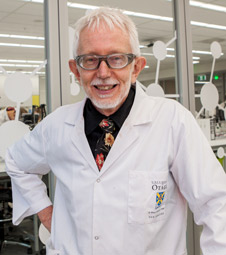Friday 18 May 2018 9:57pm
The Coalition Government yesterday revealed its first Budget – with increased money going to health, education and social welfare.
Four University of Otago experts have offered their thoughts on Budget 2018, and what it means for New Zealanders.
A general response:
Professor Paul Hansen (Economics)

Professor Paul Hansen.
Of course Budgets are intensely political affairs – that’s what makes them so interesting! And so it was with this first Budget delivered by Minister of Finance Grant Robertson on behalf of Labour, NZ First and the Greens (bearing in mind, a ‘mini-Budget’ was delivered in December). Politics is all about balancing competing objectives and appealing to politically relevant, often disparate, constituencies. This Budget delivered considerably more spending on health, education and social welfare. At the same time, impressive budget surpluses are to continue (barring more earthquakes and financial crises – fingers crossed), so that the coalition’s Budget Responsibility Rules are adhered to. And wasn’t the new government lucky to have inherited such a strong economy, delivering ever-increasing amounts of tax revenue? No wonder National is so grumpy!
Relatively un-controversially, a lot of new health spending announced in the Budget appears to be essential to keep the health system going and to stop hospitals from falling down, literally. In addition though, a big theme in the Budget, to my ears at least, is about strengthening the welfare state – intended to rescue the hundreds of thousands of adults and children from poverty. The ideological divide, and the reason we have competing political parties, is about the best way of achieving this important and universal goal (who could disagree with it?). There is no doubt that Mr Robertson and his coalition colleagues are sincere in what they want to achieve. But are they right in the best way of going about it? Time will tell.
Grant heralded his maiden Budget as being a “transformation” Budget. Let’s hope it is as far as its beneficiaries are concerned. But there wasn’t much in the Budget to transform New Zealand’s poor per capita income growth, which depends fundamentally on productivity growth - producing more from our resources - and is the main determinant of people’s material standard of living. Indeed, Grant announced that his next Budget in 2019 will measure our economy’s achievements differently, in terms of other measures of well-being than just Gross Domestic Product. Let’s hope such a widening of the government’s attention does not distract, or absolve, the government and its advisors, such as the Treasury. The main reason people are poor in New Zealand is because they earn so little relative to the cost of living. A “strong” economy, as conveniently measured in per capita GDP terms spread across the population (rather than just the rich), will always be central to how most people enjoy their lives.
Health:
What the Budget has delivered:
The vast bulk of new spending is going into health, $4 billion, part of which will go toward hospital buildings, with $2 billion of that going directly to District Health Boards.
Professor Robin Gauld (Dean of the University of Otago Business School, and researcher in comparitive health policy, health system and quality improvement, clinical governance, primary care, population based health funding formulas, and health information technology) responds.

Professor Robin Gauld.
As with any incoming government, when it comes to health, this budget has been presented in a context of considerable pressures. The prior National-led government focused efforts on tightening efficiency within the health system, along with quality, and also expected DHBs to work more collaboratively as they were widely viewed as working in isolation from one another. Its budgets constrained health spending somewhat. The Labour-led government claims to have inherited an underfunded system, and there seems to be considerable support for this. As such, they have produced a “straight-bat” budget aimed at injecting more funding into health. The various areas of focus will be welcomed by recipients – DHBs, those eligible for cheaper GP visits, midwives and so forth. The capital development funding is important, as evidenced by the problems facing Counties Manukau. Reductions in Pharmac’s budget are a potential concern. The small pocket for primary care is useful, but a plan for how this will be spent is needed. Primary care remains a highly-complex landscape. The Ministry should be charged with sorting out everything from funding for primary care and GPs through to how the sector is organised
Some areas that might have been given more emphasis are the health system itself. I’d like to have seen an innovation and change fund. We have so many wonderful initiatives developed across the health ssytem but the only way one DHB or PHO learns is through word of mouth. There is no national clearing house, or any particular reason why a DHB would try and improve services delivery, other than to cut costs. New Zealand is fast lagging behind developed countries in the lack of concerted effort in this regard. Such funding could also have been attached to an announcement that the government would be taking a hard look at the effectiveness of the DHB system. Perhaps this is yet to come. I’d suggest appointing an independent commission to look at everything from the population-based funding formula, through to DHB structures and capacity for cross-sector learning. I’d include a couple of international people on this.
Science:
What the Budget has delivered: Through Budget 2018 the Government will invest $1.1 billion of funding over four years for Research, Science and Innovation.
Professor Lyall Hanton (Chemistry) responds:

Professor Lyall Hanton.
While the Finance Minister never mentioned the word Science in his Budget speech to Parliament many of the Government’s aspirations will require Science to achieve them. A good start has already been made with $1.1 billion into Research and Development, including a tax incentive scheme, cyber protection and the toping up of various government based research funds. These research and development initiatives should encourage investment by business in much needed New Zealand-based innovation. Here, as in so many areas, such as health, New Zealand is playing catch up with the rest of the world. If we wish to have a transformative economy providing productivity, prosperity and sustainability, then we must add value to and augment our primary produce, with small footprint, low environmental impact, high-tech industries. Here Science has a key role. The desire to achieve a low carbon economy, coupled with formation of an independent climate committee and the green investment fund will all require significant involvement and advice from Science. So while not singled out explicitly in the Budget, some of the funding must find its way to Science if this transformation of our economy is to be successful.
Disability and Education
What the budget has delivered: The education sector gets $1.9 billion extra over four years – earmarked for 1,500 new teachers, 200 new classrooms and a big boost to learning support. The Learning Support spending includes the Ongoing Resource Scheme (which provides personalised funding for the most disabled students), teacher aides, and sensory schools and New Zealand Sign Language.
Dr Gill Rutherford (Senior Lecturer in Education and Disability Studies) responds:

Dr Gill Rutherford.
A budget rarely pleases everyone, and it is unrealistic to expect that yesterday’s budget can be responsive to all comers. What is hopeful however is the much needed recognition of and responsiveness to the needs and rights of those who have been marginalised for too long, particularly in education, health and housing.
Having worked in disability and education sectors for decades, it is heartening to witness the allocation of funding to support students whose labeling as “special needs” has obscured their capacities and right to quality education in local schools. Alongside this, there needs to be a prioritising of teacher education, to ensure that all future teachers are thoroughly prepared, capable and committed to teach all students well. Without the latter, any attempt to address current educational inequities is compromised, and the ideal of excellent and equitable education as a public good remains beyond reach. Perhaps the $100 million allocated to America’s Cup could be redirected to support developments within teacher education? A few fundraising bake stalls would fill the cup – eventually.
